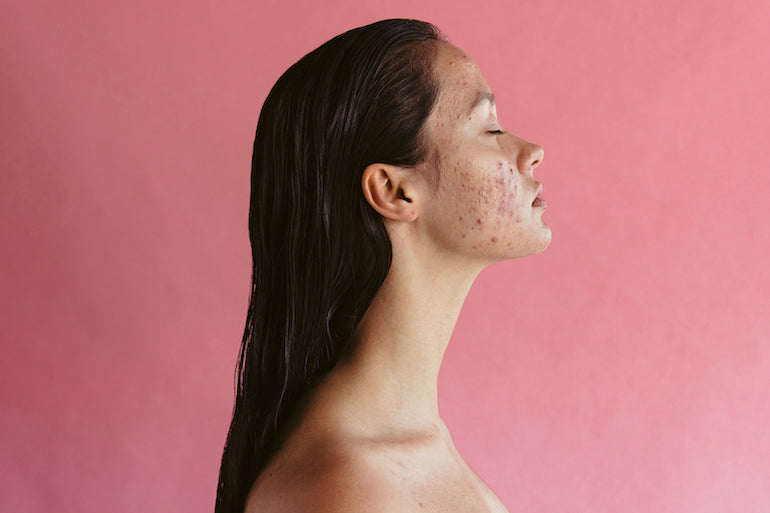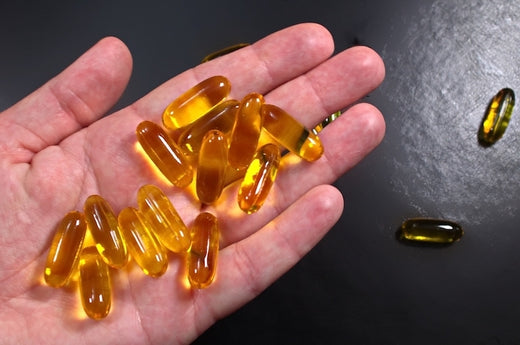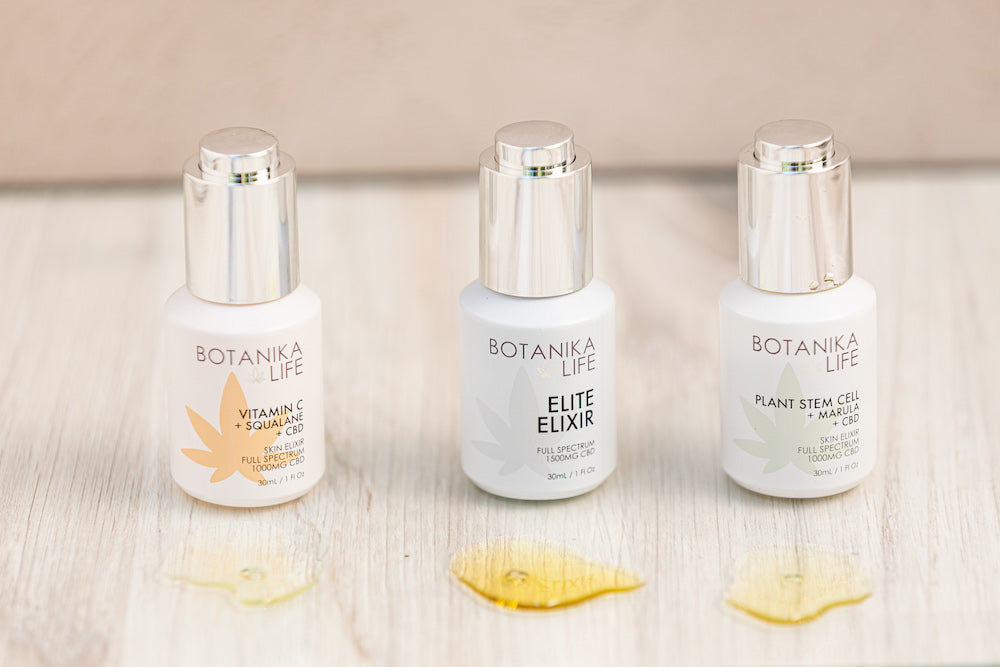
Best Natural Ingredients for Acne Treatment and Prevention
For most of us, acne can be considered part of the human experience. Even if it doesn’t plague us as much as our acne-prone teenage years, the occasional pimple may emerge from the shadows.
There are many causes of acne, including genetics, hormone changes, and lifestyle. Luckily there are also a number of natural ingredients you can use (and harmful ones to avoid) to counteract that pesky acne.
Acne occurs when the pores of your skin get clogged with excess oil, dirt, and dead skin cells. Excessive oil production and the accumulation of impurities in the pores of the skin cause pimples to form, so figuring out the best natural ingredients to use for acne is a must for prevention and treatment.
Natural Skincare Ingredients for Acne Prone Skin
If you have ever heard the term "you are what you eat", the same applies to what you put on your skin. Your skin is the largest organ of your body, absorbing whatever you put on it. Therefore, using effective and natural ingredients for acne care is of the highest importance.
CBD
Due to its anti-inflammatory properties and other healing benefits, CBD has proven to be an effective natural ingredient for acne treatment and prevention. CBD has antibacterial properties that can reduce the amount of acne-causing sebum produced by the skin. If you have yet to try CBD for your acne issues, it is known as a promising addition to your daily routine, both morning or evening.
Vitamin C
One of the best natural ingredients for acne-prone skin is Vitamin C. With natural anti-inflammatory properties, Vitamin C helps reduce the redness and irritation that goes hand in hand with acne. This vitamin is also a potent antioxidant that can help neutralize free radical damage, one of the contributing factors to acne.
Tea tree oil
With both anti-inflammatory and antimicrobial properties, tea tree oil may help treat inflammatory acne lesions – aka pimples. It’s important to note that tea tree oil should be mixed with a carrier oil to avoid skin irritation.
Kaolin clay
This all-natural ingredient is filled with essential minerals and can be used as a cleanser, exfoliator, and even a mask to prevent and treat acne. Kaolin clay unclogs your pores by absorbing the extra oil from your skin's surface. This truly is an amazing natural ingredient to look for in your skin products for acne-prone skin.
Salicylic acid
When the pores in your skin get plugged up with dead skin cells and oil, acne takes its course. Salicylic acid penetrates your skin and works to dissolve the dead skin cells that are clogging your pores. Used regularly, salicylic acid can also help prevent future breakouts.
Aloe vera
Used for centuries to treat and heal skin, aloe vera naturally contains anti-inflammatory, antibacterial, and antioxidant properties that help soothe acne-prone skin. Very few people are allergic to aloe vera, so it’s possibly one of the safest natural ingredients to include in your anti-pimple skincare routine.
Retinol
Retinol is a form of Vitamin A that is very effective in fighting acne, reducing the size of pimples, and preventing them from forming in the first place. Working from the inside of the skin out, Vitamin A increases skin-cell turnover, assisting in keeping your pores clear.
Horse Chestnut
Horse chestnut in skincare acts as a potent anti-inflammatory agent, helping to reduce redness and inflammation associated with acne. Its astringent properties also contribute to tightening pores and regulating oil production, promoting clearer skin. Additionally, horse chestnut's high concentration of antioxidants aids in protecting the skin from environmental damage, fostering a healthier and more radiant complexion. To explore whether ingredients enriched with horse chestnut is right for your particular needs, read Horse Chestnut Benefits for Skin.
Skincare Ingredients that Acne Prone Skin Should Avoid
If you are one of the many people who suffer from acne-prone skin, here are the top 5 ingredients you should always avoid. Remember, dodging the ingredients on this list is equally as important as making sure you include some of the beneficial skincare ingredients we just reviewed.
Alcohol
Counterintuitive to what most people think, drying out your skin can cause acne issues to increase. Even though an overproduction of sebum oil contributes to acne, the skin actually produces more sebum when it is too dry, causing more breakouts! Alcohol is a common harmful ingredient in toners and astringents but should be avoided at all cost.
Sodium chloride
Sodium chloride is just a fancy name for salt. Yes, you read that right; the type of salt you use in your food! Stay away from this ingredient if your skin is easily irritated and acne prone, it can instantly cause clogging in your pores.
Coconut oil
Although coconut oil can be useful for relieving ultra-parched skin, it is considered to be highly comedogenic, meaning that it can clog pores, and pose some serious issues for skin prone to acne issues.
Cocoa butter
Like its friend coconut oil, cocoa butter is also a comedogenic ingredient that can clog pores and contribute to breakouts. So, it’s safe that it’s better to stay away.
Lanolin
Although lanolin can help the skin stay hydrated, it can also clog your pores and contribute to breakouts. This ingredient can be challenging to remove from your skin, causing additional irritation, so definitely avoid it.
Additional Skincare Considerations for Preventing & Naturally Treating Acne
Keeping your skin free and clear from acne not only involves using natural ingredients, but also keeping the skin clean, free from acne-causing bacteria, and decreasing excess oil that can clog your pores. To make sure your skin isn't getting dried out and irritated from the skin care products you use, it is important to know what to look for on your product labels.
What ingredients are in your skincare products?
Stay clear of the top five negative ingredients mentioned in this article to avoid adding insult to injury with your acne situation. In addition, make sure not to clog your pores by using overall lightweight and natural products. Using gentle, PH-balanced facial products is the way to go when trying to prevent and treat acne.
Give preference to organically grown ingredients and simple formulas
Because our skin is porous, it absorbs much of what is applied to it. Even if you are not prone to breakouts, why would you want anything besides organically grown ingredients touching your skin? With the high levels of chemicals and toxins that find their way into all beauty products these days, it’s more important than ever to focus on organically grown products with straightforward simple ingredients.
A little bonus info for you - don’t neglect sun protection because acne treatments can make you increasingly sensitive to sun damage. Preventing and treating acne includes all forms of caring for your skin.
Shop Clean, Simple, and Effective Skincare With Botanika Life
Organically grown, free of pesticides and GMOs
When you are dealing with acne, you don’t want to be worrying about dangerous ingredients your skin could be absorbing. Choosing organically grown, pesticide-free products are key. Knowing your skincare routine does not include pesticides or harmful fertilizers is essential to your overall health.
This is how Botanika Life shines: delivering all-natural solutions for acne, visible signs of aging, and overall wellness.
With 1500mg of full-spectrum CBD and organic hemp seed oil, the Elite Elixir helps to soothe skin and reduce inflammation. Using clean and potent ingredients, this magical potion is a must in your daily routine.
Restore balance to acne-prone skin with Botanika Life’s Vitamin C Elixir infused with CBD and squalene to heal acne scars and even out your complexion. As an added bonus, when used with SPF, Vitamin C helps shield your face from harmful UV rays and can also reduce sun damage.

By Emily Wegener
With a unique background as an Integrative Nutrition Health Coach, Masters Degree in Teaching and experience in Psychology, Emily spends much of her time researching and trying out new holistic healing modalities.


